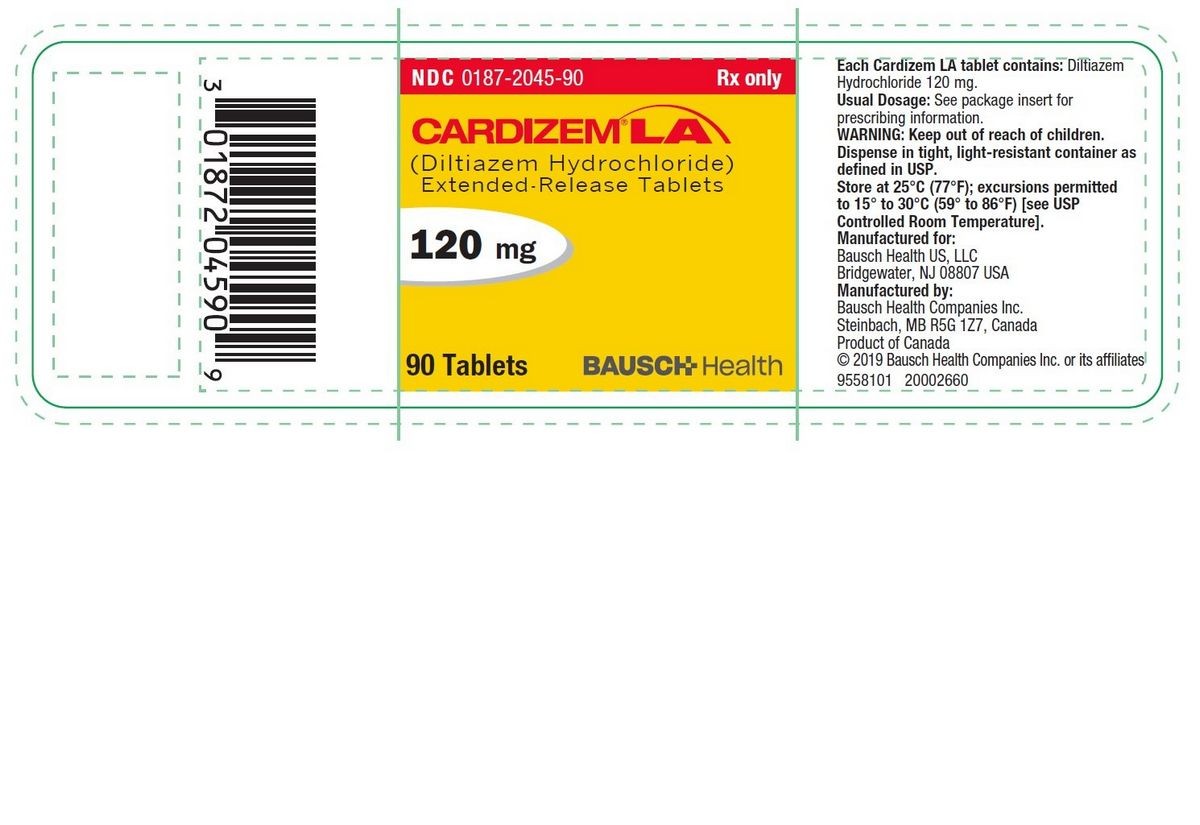
diltiazem extended-release tablet – oral, Cardizem LA
Medication Uses How To Use Side Effects Precautions Drug Interactions Overdose Notes Missed Dose Storage
USES: Diltiazem is used to treat high blood pressure (hypertension) and prevent chest pain (angina). Lowering high blood pressure helps prevent strokes, heart attacks, and kidney problems. When used regularly, diltiazem can decrease the number and severity of episodes of chest pain from angina. It may help increase your ability to exercise. Diltiazem is called a calcium channel blocker. It works by relaxing blood vessels in the body and heart so blood can flow more easily. Diltiazem also lowers your heart rate. These effects help the heart work less hard and lower blood pressure.OTHER This section contains uses of this drug that are not listed in the approved professional labeling for the drug but that may be prescribed by your health care professional. Use this drug for a condition that is listed in this section only if it has been so prescribed by your health care professional.Diltiazem may also be used to control your heart rate if you have a fast/irregular heartbeat (such as atrial fibrillation).
HOW TO USE: Take this medication by mouth with or without food, usually once daily at the same time or as directed by your doctor. Do not crush or chew extended-release tablets. Doing so can release all of the drug at once, increasing the risk of side effects. Also, do not split the tablets unless they have a score line and your doctor or pharmacist tells you to do so. Swallow the whole or split tablet without crushing or chewing. Depending on your specific brand, take this medication either in the morning or at bedtime as directed. Consult your pharmacist if you have any questions about when to take the medication. Your doctor may gradually increase your dose. Follow your doctor’s instructions carefully. Dosage is based on your medical condition and response to treatment. Use this medication regularly to get the most benefit from it. To help you remember, use it at the same time each day. It is important to continue taking this medication even if you feel well. Most people with high blood pressure do not feel sick. For the treatment of high blood pressure, it may take 2 weeks before you get the full benefit of this drug. This medication must be taken regularly to prevent angina. It should not be used to treat angina when it occurs. Use other medications (such as nitroglycerin placed under the tongue) to relieve an angina attack as directed by your doctor. Consult your doctor or pharmacist for details. Tell your doctor if your condition worsens (for example, your chest pain worsens or your routine blood pressure readings increase).
SIDE EFFECTS: Dizziness, lightheadedness, weakness, nausea, flushing, constipation, and headache may occur. If any of these effects persist or worsen, tell your doctor or pharmacist promptly. To lower the risk of dizziness and lightheadedness, get up slowly when rising from a sitting or lying position. Remember that your doctor has prescribed this medication because he or she has judged that the benefit to you is greater than the risk of side effects. Many people using this medication do not have serious side effects. Tell your doctor immediately if any of these unlikely but serious side effects occur: fainting, slow/irregular/pounding/fast heartbeat, swelling ankles/feet, shortness of breath, unusual tiredness, unexplained/sudden weight gain, mental/mood changes (such as depression, agitation), unusual dreams. Tell your doctor immediately if any of these rare but very serious side effects occur: severe stomach/abdominal pain, severe constipation, dark urine, persistent nausea/vomiting, yellowing eyes/skin. A very serious allergic reaction to this drug is rare. However, seek immediate medical attention if you notice any symptoms of a serious allergic reaction, including: rash, itching/swelling (especially of the face/tongue/throat), severe dizziness, trouble breathing. This is not a complete list of possible side effects. If you notice other effects not listed above, contact your doctor or pharmacist. In the US – Call your doctor for medical advice about side effects. You may report side effects to FDA at 1-800-FDA-1088. In Canada – Call your doctor for medical advice about side effects. You may report side effects to Health Canada at 1-866-234-2345.
PRECAUTIONS: Before taking diltiazem, tell your doctor or pharmacist if you are allergic to it; or if you have any other allergies. This product may contain inactive ingredients, which can cause allergic reactions or other problems. Talk to your pharmacist for more details. This medication should not be used if you have certain medical conditions. Before using this medicine, consult your doctor or pharmacist if you have: certain types of heart rhythm problems (such as sick sinus syndrome/atrioventricular block unless you have a pacemaker). Before using this medication, tell your doctor or pharmacist your medical history, especially of: liver disease, kidney disease, heart failure, narrowing of any part of the stomach/intestines. This drug may make you dizzy. Do not drive, use machinery, or do any activity that requires alertness until you are sure you can perform such activities safely. Limit alcoholic beverages. Before having surgery, tell your doctor or dentist that you are taking this medication. Older adults may be more sensitive to the side effects of this drug, especially dizziness, constipation, or swelling ankles/feet. During pregnancy, this medication should be used only when clearly needed. Discuss the risks and benefits with your doctor. This drug passes into breast milk and may have undesirable effects on a nursing infant. Consult your doctor before breast-feeding.
IMAGES
DRUG INTERACTIONS: Your doctor or pharmacist may already be aware of any possible drug interactions and may be monitoring you for them. Do not start, stop, or change the dosage of any medicine before checking with your doctor or pharmacist first. Before using this medication, tell your doctor or pharmacist of all prescription and nonprescription/herbal products you may use, especially of: amiodarone, digoxin, fingolimod. Other medications can affect the removal of diltiazem from your body, which may affect how this medication works. Examples include atazanavir, cimetidine, quinidine, St. John’s wort, azole antifungals such as ketoconazole, macrolide antibiotics such as erythromycin, rifamycins including rifabutin and rifampin. Diltiazem may also affect how your body gets rid of many drugs (such as buspirone, cyclosporine, sirolimus, certain statins including lovastatin and simvastatin, certain anti-seizure drugs including carbamazepine, certain benzodiazepines including triazolam and midazolam). Check the labels on all your medicines (such as cough-and-cold products, diet aids, nonsteroidal anti-inflammatory drugs-NSAIDs for pain/fever reduction) because they may contain ingredients that could increase your blood pressure or heart rate (such as pseudoephedrine, phenylephrine, ibuprofen, naproxen). Ask your pharmacist about using these products safely. Cimetidine is a nonprescription drug that is commonly used to treat extra stomach acid. Because cimetidine may interact with diltiazem, ask your pharmacist about other products to treat extra stomach acid. This document does not contain all possible interactions. Therefore, before using this product, tell your doctor or pharmacist of all the products you use. Keep a list of all your medications with you, and share the list with your doctor and pharmacist.
OVERDOSE: If overdose is suspected, contact a poison control center or emergency room immediately. US residents can call their local poison control center at 1-800-222-1222. Canada residents can call a provincial poison control center.
NOTES: Do not share this medication with others. Lifestyle changes such as stress reduction programs, exercise, and dietary changes may increase the effectiveness of this medicine. Talk to your doctor or pharmacist about lifestyle changes that might benefit you. Laboratory and/or medical tests (such as kidney/liver function tests, pulse, blood pressure, EKG) may be performed from time to time to monitor your progress or check for side effects. Consult your doctor for more details. There are different brands and types of this medication available. Many do not have the same effects. Do not change brands or types without consulting your doctor or pharmacist. Have your blood pressure checked regularly while taking this medication. Learn how to monitor your own blood pressure at home, and share the results with your doctor.
MISSED DOSE: If you miss a dose, take it as soon as you remember. If it is near the time of the next dose, skip the missed dose and resume your usual dosing schedule. Do not double the dose to catch up.
STORAGE: Store at room temperature at 77 degrees F (25 degrees C) away from light and moisture. Brief storage between 59-86 degrees F (15-30 degrees C) is permitted. Do not store in the bathroom. Keep all medicines away from children and pets. Different brands of this medication may have different storage needs. Ask your pharmacist how to store the brand you are using. Do not flush medications down the toilet or pour them into a drain unless instructed to do so. Properly discard this product when it is expired or no longer needed. Consult your pharmacist or local waste disposal company for more details about how to safely discard your product. MEDICAL ALERT: Your condition can cause complications in a medical emergency. For information about enrolling in MedicAlert, call 1-888-633-4298 (US) or 1-800-668-1507 (Canada).
Information last revised December 2013. Copyright(c) 2013 First Databank, Inc.
Report Problems to the Food and Drug Administration
You are encouraged to report negative side effects of prescription drugs to the FDA. Visit the FDA MedWatch website or call 1-800-FDA-1088.
Selected from data included with permission and copyrighted by First Databank, Inc. This copyrighted material has been downloaded from a licensed data provider and is not for distribution, except as may be authorized by the applicable terms of use.
CONDITIONS OF USE: The information in this database is intended to supplement, not substitute for, the expertise and judgment of healthcare professionals. The information is not intended to cover all possible uses, directions, precautions, drug interactions or adverse effects, nor should it be construed to indicate that use of particular drug is safe, appropriate or effective for you or anyone else. A healthcare professional should be consulted before taking any drug, changing any diet or commencing or discontinuing any course of treatment.


